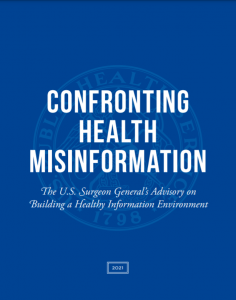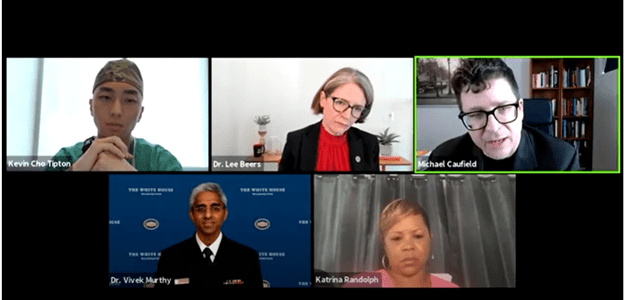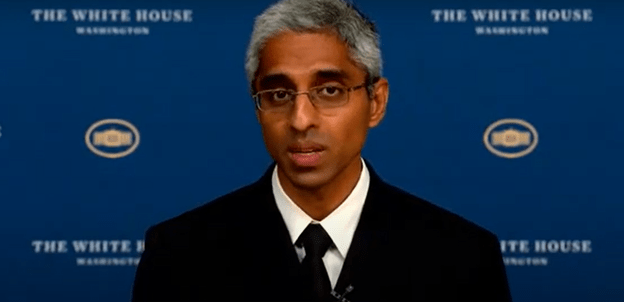By Michael Grass
In an advisory released last week, U.S. Surgeon General Vivek H. Murthy (pictured above) urged all Americans to help slow the spread of health misinformation during the ongoing COVID-19 pandemic.
 “Health misinformation is a serious threat to public health,” Murthy wrote in the advisory, released Thursday. “It can cause confusion, sow mistrust, harm people’s health, and undermine public health efforts. Limiting the spread of health misinformation is a moral and civic imperative that will require a whole-of-society effort.”
“Health misinformation is a serious threat to public health,” Murthy wrote in the advisory, released Thursday. “It can cause confusion, sow mistrust, harm people’s health, and undermine public health efforts. Limiting the spread of health misinformation is a moral and civic imperative that will require a whole-of-society effort.”
According to the surgeon general, the nation — individuals, families, health professionals, research institutions, educators, tech platforms, media organizations, governments and civic and community stakeholders — can start by focusing on the following areas of action:
- Equip Americans with the tools to identify misinformation, make informed choices about what information they share, and address health misinformation in their communities, in partnership with trusted local leaders.
- Expand research that deepens our understanding of health misinformation, including how it spreads and evolves; how and why it impacts people; who is most susceptible; and which strategies are most effective in addressing it.
- Implement product design and policy changes on technology platforms to slow the spread of misinformation.
- Invest in longer-term efforts to build resilience against health misinformation, such as media, science, digital, data, and health literacy programs and training for health practitioners, journalists, librarians, and others.
- Convene federal, state, local, territorial, tribal, private, nonprofit, and research partners to explore the impact of health misinformation, identify best practices to prevent and address it, issue recommendations, and find common ground on difficult questions, including appropriate legal and regulatory measures that address health misinformation while protecting user privacy and freedom of expression.
During a webinar hosted by Stanford Internet Observatory on Thursday following the release of the advisory, Murthy discussed the advisory’s recommendations in greater detail and moderated a panel discussion with experts, including Michael Caulfield, the director of blended and networked learning at Washington State University Vancouver who is also a faculty member at the University of Washington’s Center for an Informed Public.
During the discussion, Murthy asked Caulfield for insights of what he’s hearing from educators working to teach students and others how to sort fact from fiction.
“There’s a vast, untapped energy from educators who see this problem and want to address it in the classroom,” Caulfield said. “All they need is a little bit of support in terms of faculty development and some curriculum materials that they feel comfortable with. It doesn’t take much to get started.”
And once they do get started, Caulfield said, teachers and students find misinformation awareness and information literacy lessons engaging. When students are taught “lateral reading” — where students are taught not to immediately engage with misinformative content they come across but instead “quickly figure out where it came from, who else is saying it and what others are saying about that claim” — they benefit students in other domains of learning.

Washington State University Vancouver’s Michael Caulfield (top right) who is also a University of Washington Center for an Informed Public faculty member, joined a panel of experts for Stanford Internet Observatory webinar about health misinformation that was moderated by U.S. Surgeon General Vivek H. Murthy (bottom left).
“You can teach it in history and you can find that students can apply them in nutrition,” said Caulfield, who developed the SIFT factchecking method and has facilitated workshops for MisinfoDay, an annual misinformation awareness educational event the UW Center for an Informed Public co-presents through a statewide partnership with Washington State University’s Murrow College of Communication.
Earlier this year, UW’s Center for an Informed Public joined other organizations, including Stanford Internet Observatory, New York University’s Center for Social Media and Politics and Tandon School of Engineering, Graphika, and the National Conference on Citizenship, to co-found the Virality Project, a rapid-response research collaboration that has monitored and analyzed mis- and disinformation related to COVID-19 vaccines in recent months and facilitated real-time information exchange among research, public health, tech and government stakeholders.
“We can address this challenge of misinformation. It will take all of us and a broad, all-of society response. It is something we are capable of doing if we put our mind to it,” Murthy said during Thursday’s webinar. “If we work together I do believe we can stem the tide of misinformation and that we can help people get the accurate information they need to make good decisions for their health and that is how we can save lives.”



